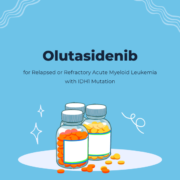Olutasidenib for Relapsed or Refractory Acute Myeloid Leukemia with IDH1 Mutation
Introduction
Once again a new drug that was recently FDA approved for some Acute Myeloid Leukemia (AML) patients. Olutasidenib (brand name: Rezlidhia) was approved in December 2022 for AML patients who have relapsed or are refractory to treatment (R/R) with a mutation in the Isocitrate Dehydrogenase 1 (IDH1) gene. There is a different gene called IDH2, which can also be mutated in patients with AML, but different medications are used for IDH2 mutations.
An existing drug, called ivosidenib (brand name: Tibsovo) was already approved for patients with AML and a mutation in IDH1. It was initially approved in July 2018 as a single agent for patients with R? AML with a IDH1 mutation. Later it was approved for use in combination with azacytidine for newly diagnosed AML patients with an IDH1 mutation. There was also a specific test (the Abbott RealTime IDH1 Assay) approved along with the initial approval of ivosidenib. This test was also approved to select patients to be treated with olutasicdenib.
Results of the Current Study
The study used to support the approval was a non-randomized trial (all patients received olutasidenib). The study included patients with AML and ones with Myelodysplastic Syndrome (MDS) who had a mutation in the IDH1 gene. Patients were treated with olutasidenib as a single agent (monotherapy) as well as combined with azacytidine. The approval was based on the results of the 147 patients who received olutasidenib monotherapy (the results are described in detail here).
In the study, about 35% of patients achieved a complete remission (CR) or complete remission with partial hematologic recovery (CRh) – the latter means that they appear to be in remission, but their blood counts are not normal. In addition, about one third of patients who were platelet and/or red blood transfusion dependent at the start of the trial eventually did not require transfusions for 8 or more consecutive weeks (transfusion independent). All patients experienced 1 or more adverse events (AEs) and almost all experience a serious (Grade III or IV) AE. These AEs are expected in patients with AML, particularly older patients, as most of the patients were.
Comparison with Ivosidenib
Now that there are 2 drugs approved for AML patients with an IDH1 mutation, the question becomes which drug should be used and in which circumstances. There have been no studies (at least ones that are published) that directly compare the drugs. According to the paper from Bload Advances on the responses to olutasidenib and ivosidenib as single agents was about the same, however the length of remission in the patients receiving olutasidenib (a median of 25.9 months) compared to ivosidenib (8.2 months0. The big caveat is that, since the comparison was not randomized, it is difficult to determine if there were differences in risks in each group. My guess is that there will not be a randomized comparison of these two groups.
It will be more interesting to look at these drugs in combination with azacytadine and also as a 3 drug combination of azacytidine and venetoclax. In addition, these drugs could be combined with existing intensive chemotherapy regimens (for instance, so-called 7+3 induction with cytarabine and daunorubicin). Likely the combinations would produce more remissions but might have significantly more side effects.
In summary, the good news is that there is another drug that can help some patients with AML, the bad news is that the determination of the best therapy is yet more complicated.
Further reading
Olutasidenib:
- FDA Approves Olutasidenib (Rezlidhia) for Certain Patients With AML from Medscape, (registration maybe required, but should be free)
- FDA approves olutasidenib for relapsed or refractory acute myeloid leukemia with a susceptible IDH1 mutation press release from FDA.
- Olutasidenib (FT-2102) induces durable complete remissions in patients with relapsed or refractory IDH1-mutated AML, article abstract from Blood Advances (Blood Adv (2023) 7 (13): 3117–3127).
- Olutasidenib Elicits Durable Responses in IDH1-Mutant, Relapsed/Refractory AML from OncLive, article about presentation at ASH Annual Meeting.
- Effect of olutasidenib (FT-2102) on complete remissions in patients with relapsed/refractory (R/R) mIDH1 acute myeloid leukemia (AML): Results from a planned interim analysis of a phase 2 clinical trial. From Journal of Clinical Oncology, Volume 39, Issue 15 supplement.
- IDH Inhibitor Olutasidenib Active With or Without Azacitidine in IDH1-Mutated AML, ASH Clinical News
Ivosidenib:
- Ivosidenib: IDH1 Inhibitor for the Treatment of Acute Myeloid Leukemia From Journal of the Advanced Practitioner in Oncology
- Ivosidenib with Chemotherapy New Option for Some People with AML, Natonal Cancer Institute Cancer Currents Blog.
- Targeted Drug Approved for Acute Myeloid Leukemia with IDH1 Gene Mutations Natonal Cancer Institute Cancer Currents Blog, August 13, 2018, updated May 2, 2019.
- Ivosidenib and Azacitidine for IDH1-Mutated AMLa previous blog entry of mine, November 16, 2022.

AML Network Manager
Art Flatau lives in Austin, Texas with his wife Gretchen. They have 2 grown children. He was diagnosed with Acute Myeloid Leukemia (AML) in 1992 at the age of 31, while still in graduate school at the University of Texas. Gretchen and Art’s kids were 2 and 4 at the time. He received chemotherapy (both induction chemotherapy and then consolidation). After graduating with a Ph.D. in computer science in December 1992. He relapsed in early 1993 and then had a bone marrow transplant (BMT), his brother was a perfect match.





![[ACT]IVATED [ACT]IVATED logo](https://powerfulpatients.org/wp-content/uploads/ACTIVATED-180x180.png)




